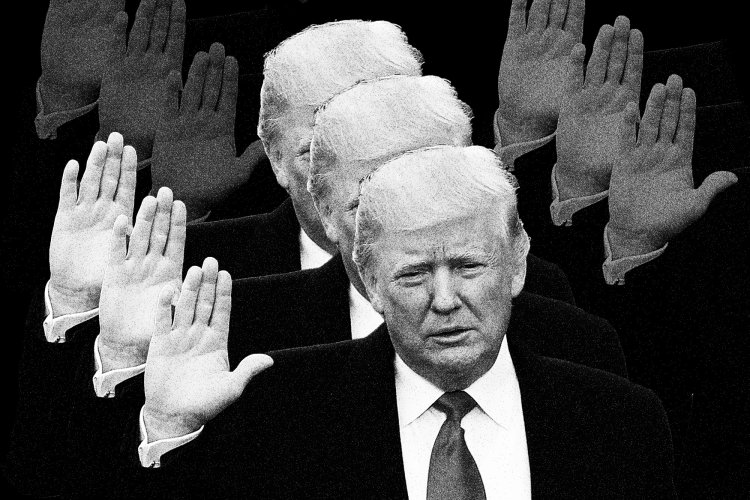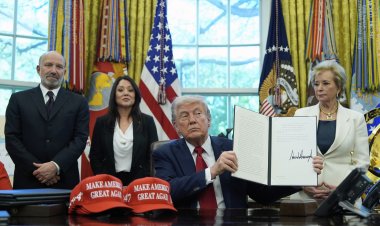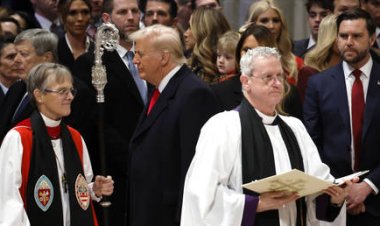How Trump Might Secure a Third Term — Regardless of the 22nd Amendment
Exploring four potential strategies that could allow Trump to maintain his influence and authority beyond the year 2028.

It's January 20, 2029. The country has endured another chaotic four years with Donald Trump at the helm. Democrats are eager for the Trump era to finally end, while Republicans have embraced it.
Now, picture this: The chief justice begins administering the oath of office. The next president lifts his right hand and proclaims:
“I, Donald John Trump, do solemnly swear…”
This scenario embodies the nightmares of liberals and the fantasies of MAGA supporters: a potential third term for Trump.
But surely, it can't happen, right? The Constitution enforces a clear two-term limit for the presidency — even if the terms are non-consecutive, as with Trump’s. “No person shall be elected to the office of the President more than twice,” as stated in the 22nd Amendment.
Even Trump, known for bending norms and flouting laws, couldn't possibly find a loophole in that unmistakable constitutional barrier, could he?
Don’t be so confident.
Worldwide, leaders who amass power through strong personalities rarely relinquish it willingly, even when facing constitutional restrictions. Trump has already demonstrated attempts to hold on to power beyond his legitimate tenure.
“Anyone who says that obviously the 22nd Amendment will deter Trump from trying for a third term has been living on a different planet than the one I’ve been living on,” asserts Ian Bassin, who was an associate White House counsel for President Barack Obama and is currently the executive director of the nonprofit advocacy group Protect Democracy.
If Trump chose to cling to power beyond 2028, he could pursue at least four potential routes:
He might rally a movement to directly repeal the 22nd Amendment. He could exploit a little-known loophole within the amendment that might allow him to run for vice president and then swiftly return to the presidency. He could also run for office again on the gamble that a compliant Supreme Court wouldn’t intervene. Lastly, he could choose to simply refuse to step down, marking an abrupt end to America's democratic experiment. Each of these options would encounter significant political, legal, and practical challenges. However, the possibility of Trump securing a third term shouldn’t merely be brushed aside.
Trump, in fact, isn’t ignoring this potential. He has been openly discussing it for years.
In August 2020, he told supporters: “We are going to win four more years. And then after that, we’ll go for another four years.”
In May 2024, he again hinted at a three-term presidency.
On November 13, 2024, one week after winning his second term, he told House Republicans: “I suspect I won’t be running again unless you say, ‘He’s so good we’ve got to figure something else out.’”
And just last weekend, he remarked: “It will be the greatest honor of my life to serve not once but twice — or three or four times,” before quickly adding, “Nah, it will be to serve twice.”
Perhaps it’s all just a joke to Trump, or maybe he’s just teasing the media. Regardless, the repeated discussions signal that the idea occupies his thoughts. It's necessary to evaluate this possibility with sincerity.
Why Trump Might Do It
Several initial objections to this notion originate not in constitutional theory but in physical and psychological reality: Would Trump, who would be 82 at the end of his second term, be healthy and capable of serving a third? And if he could, would he even desire to run again?
On January 20, 2029, he might choose a quiet retirement on the fairways of Mar-a-Lago, having triumphed over his adversaries and solidified his legacy.
However, if he believes he can continue in power, Trump could have compelling reasons to seek to maintain the privileges of the presidency.
A significant factor driving his 2024 campaign was the intent to evade his criminal charges. This strategy proved successful. Following his victory, the two federal charges against him had to be shelved due to the Justice Department's long-standing position that a sitting president cannot be prosecuted. His election also compromised the tenuous case against him in Georgia. In the New York hush money case — the only one to reach trial and result in a conviction — Trump received a mere “unconditional discharge,” hardly a significant consequence.
However, Trump might still not be entirely free of his legal troubles by the end of his second term. When special counsel Jack Smith recently dropped the federal charges against Trump, he stated the option for a future Justice Department to revive those charges post-presidency remained open. If a Democrat appears poised to win the 2028 election, Trump might be concerned that those charges could resurface.
Moreover, it’s uncertain what Trump might do in the coming four years that could expose him to new legal jeopardy. While last year's Supreme Court ruling on immunity would complicate prosecuting him for presidential actions, it would not be an unassailable barrier. If serious calls to prosecute emerge after his second term, Trump might conclude that the best way to prevent that is simply to remain in office.
Beyond using the presidency as a legal shield, Trump could be driven by a more primitive urge: the thirst for power. This motivation drives many autocratic leaders worldwide, particularly those undermining democracy with grandiose rhetoric.
“Presidents tend to like their jobs, and there have been many attempts for them to overstay,” observes Mila Versteeg, a law professor at the University of Virginia.
Versteeg co-authored a 2020 study of 234 heads of state across 106 countries in the 21st century, revealing that one-third sought to skirt legally enforced term limits. Many succeeded, often by navigating legal ambiguities or persuading compliant courts to approve their consolidation of power.
Recep Tayyip Erdogan in Turkey, Daniel Ortega in Nicaragua, and Vladimir Putin in Russia all followed this path. The list includes many leaders Trump admires.
“In the countries where this has happened, the rule of law is much weaker than in the United States,” notes Versteeg. “But we shouldn’t dismiss it as impossible or unimaginable. It has happened around the world.”
How Trump Might Do It
If Trump aimed to make this a reality in the U.S., could he?
On the surface, the 22nd Amendment appears to solidly prohibit this possibility. Ratified in 1951 in the wake of Franklin Delano Roosevelt's four-term presidency, the amendment has prohibited anyone from being elected to a third term. Preceding Roosevelt, no president had ever sought reelection after serving two terms — a guideline established by George Washington.
Importantly, the amendment does not limit non-consecutive terms. Constitutional scholars broadly agree that the two-term cap applies to any two terms served by an individual, whether consecutive or not.
Yet that doesn’t end the discussion. Constitutional rules are only as robust as the institutions that uphold them. Trump could potentially chip away at these rules or even attempt to outright defy them using both legal and extralegal means. He is already seeking to alter citizenship provisions stated in the 14th Amendment. Why would he hesitate to try a similar approach regarding term limits in the 22nd?
Here are four strategies he might explore.
Option 1: Change the Constitution
The most apparent route would be for Trump to persuade Americans to repeal the 22nd Amendment entirely. Repealing an amendment is permissible — it has happened before, as seen with the 18th Amendment, which prohibited alcohol sales.
However, a formal repeal would necessitate widespread support that seems unlikely in today's divided political climate. A new amendment would require two-thirds of both chambers of Congress or two-thirds of the states to convene a constitutional convention. Afterward, three-fourths of the states would need to ratify the proposed amendment. Even if Trump retains popularity among Republicans, securing the requisite majorities appears challenging.
Still, some conservatives are eager to try.
Tennessee GOP Rep. Andy Ogles has initiated efforts for a constitutional amendment allowing Trump to seek a third term.
Additionally, The American Conservative laid the groundwork for this idea even before Trump's latest victory, publishing an article advocating for the repeal of the 22nd Amendment should he win a second term.
“If, by 2028, voters feel Trump has done a poor job, they can pick another candidate; but if they feel he has delivered on his promises, why should they be denied the freedom to choose him once more?” wrote Peter Tonguette, contributing editor for the magazine.
In anticipation, some Democrats are taking precautions. Rep. Dan Goldman of New York proposed a resolution last fall reiterating that the 22nd Amendment applies to non-consecutive terms.
Additionally, several blue states are working to rescind their previously issued requests for a constitutional convention, fearing that Republicans might use these dated requests to convene and propose unpredictable amendments. Some supporters of Trump in Congress, including House Budget Chair Jodey Arrington, believe the necessary two-thirds state requests are already in place.
Trump hasn’t officially backed an amendment push. Nonetheless, he recently shared a social media post from Texas Lt. Gov. Dan Patrick, praising Trump's first week in office. “People are already talking about changing the 22nd Amendment so he can serve a third term,” Patrick commented. “If this pace and success keeps up for four years, and there is no reason it won’t, most Americans really won’t want him to leave.”
Option 2: Sidestep the Constitution
If formally amending the two-term limit proves impractical, Trump could look for a loophole.
The language of the 22nd Amendment bars someone from being “elected” for a third presidential term but doesn’t specifically forbid ascent to the presidency through other legal means, such as becoming vice president and subsequently assuming the presidency through the death, resignation, or removal of the incumbent.
This nuance allows for a clever scenario. Picture Trump as the vice-presidential choice of a Republican nominee — say, JD Vance — who pledges to resign on Day 1, handing the presidency back to Trump should he win.
The slogan practically writes itself: “Vote Vance to Make Trump President Again.”
While this may seem like an improbable ruse, it's plausible if Trump maintains the hold over the Republican Party that he showcased in 2016, 2020, and 2024. If Vance refuses to comply, Trump could easily find a willing alternative.
Of course, such a strategy carries inherent risks for Trump; he must trust his chosen successor's commitment to relinquish the presidency immediately. The successor could break the agreement post-election. Yet, if the campaign explicitively promised Trump’s immediate reinstatement as president, the political pressure to uphold that pledge would be substantial.
Trump, who thrives on displays of loyalty from his allies, may find this arrangement appealing.
“It would not be surprising — if the president were interested in the presidency again — that he would seek to go down this path,” notes Bruce Peabody, a law professor at Fairleigh Dickinson University.
Peabody discussed the potential for a twice-elected president to occupy other high-ranking positions, allowing the possibility of a return to the presidency, long before Trump entered politics. He concluded that such a scenario is not only feasible from a constitutional perspective but also politically plausible.
One might liken it to the Putin-Medvedev dynamic. In 2008, when term limits barred Putin from continuing as president, he served as “prime minister” under President Dmitry Medvedev, effectively maintaining control until returning to power.
In the U.S., however, the 12th Amendment poses a complication, mandating that those "constitutionally ineligible to the office of President shall not be eligible to that of Vice President." If Trump is deemed unqualified for a third presidential term under the 22nd Amendment, he might similarly be deemed ineligible for the vice presidency under the 12th.
But the nuance here is critical: the 22nd Amendment only states that he cannot be elected to a third term and does not assert he is ineligible to serve. Therefore, it’s arguable that he could still pursue the vice presidency.
“You could make a case that it’s pretty clear that a twice-elected president is still eligible,” Peabody explains. “You could also make a case that it’s murky. But I don’t find the argument terribly convincing that it’s a slam dunk that he isn’t eligible.”
Option 3: Ignore the Constitution
Should the first two options seem too convoluted, Trump could take a more brazen and audacious approach: run for a third term and see if anyone stands in his way.
Identifying who might intervene—or how—is a challenging puzzle. Could the Republican National Committee prevent him from seeking the party nomination for 2028? Probably not, given Trump's ongoing dominance in the GOP. Would states refuse to include him on their ballots? Some states might, but this would invite legal battles. Consequently, any challenge would likely reach the Supreme Court, a bench already perceived as sympathetic to Trump’s interests, and potentially even staffed with more Trump appointees by then.
But would the Court really endorse a blatant violation of the 22nd Amendment? While it appears improbable now, the context of the 2028 election season plays a crucial role.
During that time, Trump would be campaigning, asserting his candidacy is crucial for national benefit. The RNC would identify him as their nominee, and a significant portion of the public could continue their unwavering support for him.
It’s not difficult to envision that for the Supreme Court, declaring Trump ineligible to run would require immense political courage amidst such a scenario.
“All you need is a court that is willing to be your faithful helper,” Versteeg asserts, noting, while unlikely, it’s not out of the realm of possibility for the current court to align with Trump’s interests.
Bassin at Protect Democracy is even more direct in his criticism of such potential scenarios.
“The court’s gonna tell the Republican Party that they can’t run their candidate?” he questions. “I don’t think so.”
In fact, similar complexities have already been observed in recent legal decisions. Some legal scholars maintain that Trump was constitutionally ineligible to run in 2024 due to the 14th Amendment’s disqualification from holding federal office for those who have engaged in insurrection. However, when Colorado sought to enforce this disqualification by removing Trump from its ballot, the Supreme Court intervened, declaring that only Congress could enforce the insurrection ban, despite the 14th Amendment's lack of such a stipulation.
That ruling suggested a degree of result-driven decision-making: legally sound arguments notwithstanding, the justices seemed unwilling to allow individual states to remove the leading Republican candidate from their ballots. Similar reasoning could apply if Trump were to attempt another run in 2028.
Some may argue that the directive of the 22nd Amendment is far more clear-cut than the 14th’s ambiguous language. However, litigation often obscures even the most straightforward constitutional language, and Trump’s legal team will have many opportunities to make the two-term limit seem less definitive.
They might even craft originalist arguments that reinterpret the amendment’s meaning or suggest it only applies to consecutive terms. Trump ally Steve Bannon has already floated this narrative. Alternatively, they could assert procedural impropriety in the amendment’s ratification, a common tactic employed elsewhere to undermine constitutional limits.
Or they could argue that deeper constitutional principles take precedence over the 22nd Amendment, suggesting Trump has a due process right to seek presidency or that voters possess a due process right to select their candidate without regard to the 22nd Amendment.
Despite the general consensus among constitutional scholars that these assertions lack strength, presenting them in court and the public realm can render the issue debatable. As legal scholar Jack Balkin has noted, this normalization process could potentially turn outrageous constitutional claims into accepted doctrine embraced by the Supreme Court.
Option 4: Defy the Constitution
Finally, there's one last method Trump might employ to retain power. This option would neither involve amending the Constitution nor securing a pact with a running mate ready to transfer the presidency. It wouldn’t even demand Trump go through the motions of running again.
He could simply refuse to leave office.
Predicting how this scenario might unfold is challenging. One strategy typical for autocratic leaders is to declare a national emergency and cancel an election. The president lacks the legal authority to postpone elections. Nevertheless, Trump might attempt it, leveraging a crisis or even instigating a conflict as a pretext. Alternatively, he could permit the 2028 election to occur with other candidates, only to contest the result as rigged and assert his right to remain in power.
It's reasonable to argue that Trump has highlighted his anti-democratic tendencies in the initial stages of his new term. He has rapidly consolidated authority across government, instituting loyalty tests, ousting independent federal watchdogs, and attempting to wrest control of financial oversight from Congress. Additionally, he has exonerated political violence associated with his name through pardons for January 6 rioters, including those from extremist groups like the Oath Keepers and Proud Boys.
Following his last attempt to cling to power, Trump propagated falsehoods regarding election fraud, undermined the 2020 results, and incited his supporters to “go wild” in Washington, D.C., on the day of certification for his defeat. Four years from now, could he execute an even more audacious and unlawful power play? This is a profound consideration. Scholars of authoritarianism suggest that when practices like term limits erode, it's rarely due to a singular coup but instead a gradual decay, often enabled by institutions within the constitutional framework.
On January 20, 2021, after multiple attempts to overturn Joe Biden’s victory failed, Trump vacated office. Power transitioned, and the nation’s democratic institutions endured.
If he threatens the transfer of power again, there’s no guarantee American democracy will weather the storm once more.
One truth remains evident: The mere existence of the 22nd Amendment will not suffice.
Thomas Evans for TROIB News












